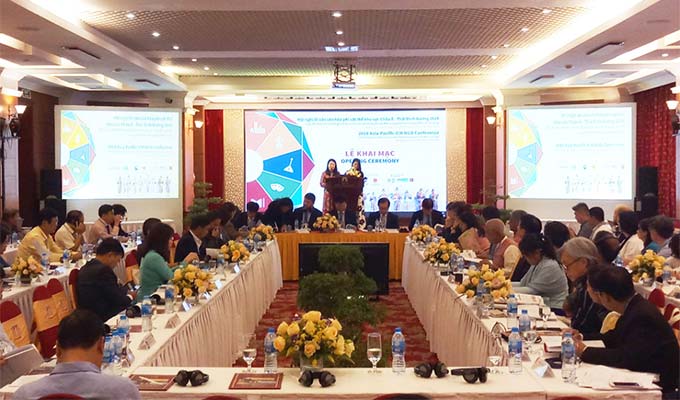The 2018 Asia-Pacific Intangible Cultural Heritage (ICH) Non-Government Organisation (NGO) Conference opened in the central province of Thua Thien-Hue on November 6, under the theme of “ICH NGOs towards the Sustainable Development of Communities”.

An overview of 2018 Asia-Pacific ICH NGO Conference
Since 2014, the International Information and Networking Centre for Intangible Cultural Heritage in the Asia-Pacific Region (ICHCAP) has been organising international ICH conferences biennially as a networking platform for NGOs. This specific conference will focus predominantly on the work of non-governmental organisations (NGOs) in the Asia-Pacific region’s ICH field.
This year’s three-day conference has attracted the participation of representatives from 35 organisations from 16 nations.
Its discussions focus on the relationship between intangible cultural heritage and sustainable development.
Delegates are expected to exchange views on and experience in projects related to the role and potential of NGOs in safeguarding intangible cultural heritage, in educating about ICH work towards sustainable development, in developing cities and communities comprehensively through disseminations on ICH, and in making proposals to better the support of NGOs for ICH conservation in the region.
The conference also includes a special session on ICH safeguarding in Viet Nam, in which speakers are expected to discuss the 15-year implementation of the 2003 UNESCO Convention for the Safeguarding of the Intangible Cultural Heritage.
Nong Quoc Thanh, deputy head of the Department of Cultural Heritage under the Ministry of Culture, Sports, and Tourism, said that Viet Nam was one of the first 30 countries to participate in the 2003 Convention.
Viet Nam currently owns 62,283 confirmed pieces of ICH, including 271 national heritages and 12 UNESCO-recognised ones. By local heritages entering the national-level and international-level lists, they have provided the motivation for renewed cultural heritage conservation efforts.
Along with contributions by social organisations, Viet Nam hopes to receive support from foreign experts, in ways of approach, experience, and resources, so as to protect and promote national cultural heritage values, Thanh added.
Phan Thanh Hai, Director the Hue Monuments Conservation Centre, stressed that Thua Thien-Hue has five UNESCO-recognised heritages, all of which are from the Nguyen Dynasty.
This conference offers a chance for the locality to partake in accurate and objective assessments to carry out policies towards the sustainable development of its intangible cultural heritage, expanding the cooperation in and promotion of its heritage, Hai said.